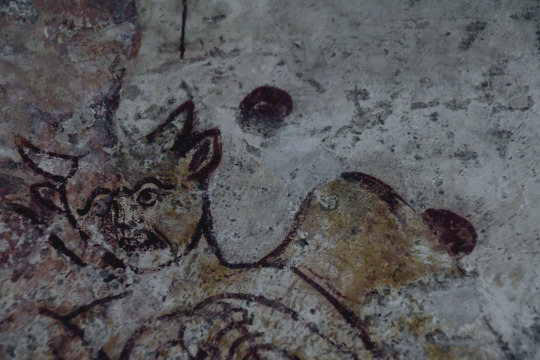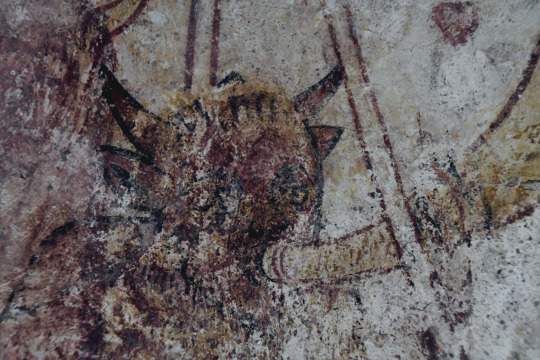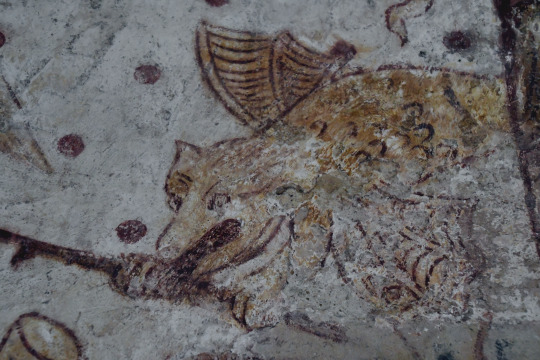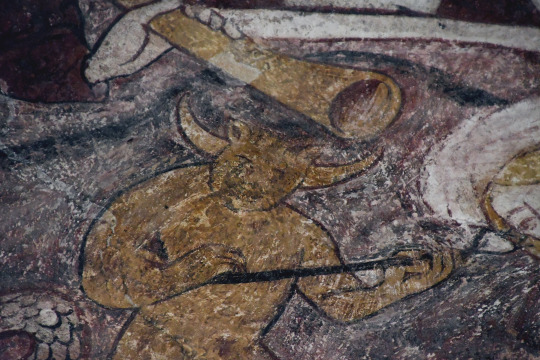#Legends and folklore
Explore tagged Tumblr posts
Text
From The Depths: The Enchanting Secrets of Sea Witches
What are Sea Witches? Sea witches are mystical beings who have a deep connection to the sea and its elements. They are often depicted as powerful sorceresses who possess magical abilities related to water, storms, and marine life. Sea witches are believed to harness the energy of the ocean to cast spells, perform rituals, and communicate with sea creatures. They are known for their knowledge of…

View On WordPress
#Ancient Sorcery#elemental magic#Enchanted Sea#Legends and Folklore#Magical Rituals#Maritime Magic#Maritime Traditions#mystical practices#Mythical Creatures#Ocean Magic#Sea Goddesses#Sea Witchcraft#Sea Witches#Witchcraft Beliefs#witchcraft history
9 notes
·
View notes
Text

It's a bright sunny day (maybe???) and Egyptians sailors come across a shipwreck in the Red Sea. There is only one survivor. DUN. DUN. DUNNNNNNNNN. It is an Indian man. NAAAAAAAAAAAAANIIIIIIIIIIIIIIII? The Egyptians took him to the king's court in Alexandria.

The Indian sailor soon learned to speak Greek and offered his services by offering to help guide Egyptians ships to India -- good idea to the king, who commanded Eudoxus of Cyzicus- a greek sailor and trader.
The Indian sailor taught Eudoxus (say that 10 times fast...don't, I already hate typing it) the "secrets" of sailing using Indian monsoon winds and their patterns/directions in summer and winter and as you can imagine - kerboom. Egyptian and Indian maritime trade routes established. Eventually land routes followed and were developed from places such as Anatolia - watch towers began to pop up along the way, eventually Roman soldiers guarding ways.
Because bandits were a thing. So, what did India trade? Well, so damn much. Silverware, printed clothes, perfumes/scented oils, spices. Ice. Yes, mountain ice. Salts. Gems. Everything. And this trade benefitted India FAR more than the countries coming to it. Also coral. Yeah, that wasn't just for 2000's teens wearing it in necklaces. If you know...you know. Also, animals. There was a huge "Exotic" animal trade as well - tigers, rhinos, serpents were exported.
#picture it#ancient egypt#egyptian#India#indian history#indian trade#ancient world#bandits#maritime history#trade routes#egyptian history#old world#coral#perfume#trade#gems#spices#exotic animals#history and culture#history in the making#history stuff#myths and legends#legends and folklore#folklore#did you know#how cool is this
1 note
·
View note
Text
The Local Treasure I’ve Yet to Explore
Name an attraction or town close to home that you still haven’t got around to visiting. Artifacts of history seem to blend with the sky, reflecting the museum’s role as a bridge between the local past and global culture. There’s a place near home I’ve long meant to visit—a hidden gem nestled on Whitewoman Street in Coshocton, Ohio: the Johnson-Humrickhouse Museum (JHM). It’s a cultural treasure…

View On WordPress
#American Indian Gallery#Coshocton Ohio#cultural museums#dailyprompt#dailyprompt-1827#Decorative Arts#Johnson-Humrickhouse Museum#legends and folklore#local attractions#Ohio history#small-town treasures#Whitewoman Street
0 notes
Text
With the Lunar New Year fast approaching, it is time to say goodbye to the Year of the Rabbit and hello to the Year of the Dragon.
Most people will have at the very least a passing familiarity with the Chinese Zodiac – a twelve-year cycle in which each year relates to a corresponding animal. These twelve animals are the rat, ox, tiger, rabbit, dragon, snake, horse, sheep, monkey, rooster, dog, and pig. Those born under a specific sign are said to have certain characteristics, for example, rats being generous, dogs being loyal and dragons being adventurous.
This Zodiac has been used for over 2000 years, and there is one famous story about how it came to be and, specifically, how each animal came to take their place in the order of the Zodiac.
Once, the Jade Emperor – the ruler of heaven - decided that there should be a way to measure time. On his birthday he called for a race between the animals, a year would be named for each of them in the order that they had finished the race. The animals would have to race across a mighty river with strong currents. When the day came the animals lined up along the opposite bank in anticipation, waiting for the race to start.
Keep Reading
#Lunar New Year#Lunar New Year 2024#Year of the Dragon#Chinese Zodiac#Zodiac#Legends and Folklore#Mythos#Myths and Legends#Mythos Retelling#Mythos Retellings#Mythos Articles#New Year#Animals of the Zodiac#Dragon#Dragons#Animal stories#Animals#Happy New Year
1 note
·
View note
Text

#old book#books & libraries#dark academia#light academia#witchy#legend#antique#ancient#mythology#myth#whimsigoth#library#museum#Edwardian#Victorian#folklore#witch#witchcraft#paganism#books#booklr#flowers#plants#whimsicore#Fairycore#magick#whimsical#graphic design#art#art history
1K notes
·
View notes
Text

Kelpie.
#my art#art#artwork#my artwork#artists on tumblr#illustrator#illustration#paint#painting#draw#drawing#watercolor#watercolour#gouache#markers#ink#folklore#fantasy ambient#dark fantasy#scotland#legend#myth#horror#dark#kelpie#april#colorful
743 notes
·
View notes
Text




The UK'S Royal Mail captures the four eras of girlhood in its latest stamp release, Myths and Legends.
Issued March 27, 2025. Art by Adam Simpson.
#postage stamps#UK#Royal Mail#myths and legends#British folklore#Irish folklore#grindylow#selkie#Blodeuwedd#piskies#tag yourself#we're jenny greenteeth today
615 notes
·
View notes
Link
In today's new Longreads essay, Elizabeth Friend examines the vanishing hitchhiker tale, and one spooky North Carolina story in particular: the tale of a young woman named Lydia.
There are countless variations on Lydia’s story. Sometimes her dress is a specific color. Sometimes a different family member opens the door. Sometimes the young man drapes his jacket over the girl’s shoulders, only to find it later on her grave.
Elizabeth explores how folklore passed down over generations reveals our anxieties during times of change. The ghost story of Lydia reflects the shifting expectations of American women in the first half of the 20th century.
Read “The Lessons of Lore” on Longreads.
#longreads#essay#ghosts#halloween#hitchhikers#myth#folklore#legend#ghost stories#women#culture#history#American history
772 notes
·
View notes
Text
"The Deadname Meme"
by Queerious
Our Pride episode for 2024 has been released, featuring guest @demilypyro and returning guest @circeofjagd, as well as @iridethedirt, Lee Daniel, and Breck Wilhite!
You can find more of Demily on Twitch (https://twitch.tv/demilypyro) and the ruins that were once Twitter (https://twitter.com/demilypyro).
Happy Pride!
#scp#the scp foundation#the scp foundation database#reading#reader#voiceover#sci-fi#horror#urban legend#folklore#fiction#podcast#lgbtq#pride#transgender
1K notes
·
View notes
Text











Devils and the Mouth of Hell details from South Leigh doom painting 15th C- South Leigh, UK
#occult#gothic#folklore#memento mori#goth#folk horror#skull#dead#wall art#painting#doom painting#fresco#medieval art#art history#medieval#devil#demon#satan#monster#hell#hell mouth#mouth of hell#horror#myth#legend#creepy#macabre#goth aesthetic#goth vibes#goth goth
2K notes
·
View notes
Text





Balsareny Castle, Central Catalonia.
This Medieval castle was started in the year 951, with significant reforms in the 14th century. The chambers in the upper floor was restored in the 19th century.
The castle's building is explained in a local legend, according to which the castle is also called "The Castle of the Ninety Nine Chambers". The legend says that the Lord of Balsareny wanted to build a castle, but he didn't have enough people nor money to build it. He counted his means and thought over it, but he couldn't figure out a way until, desperate, he said "I would give anything to build my castle!". Hearing those words, the Devil appeared to him and offered him a deal: the Devil promised to build him a castle with 100 chambers, and in return the Lord would give him the soul of one of his vassals. The Lord accepted.
The Devil worked tirelessly, and in 6 days he had already built 99 chambers, one more and he would be finished. The Lord of Balsareny regretted having promised the soul of one of his vassalls, and decided to stop the deal. He placed an image of the Virgin Mary in the building. From then on, as the Devil worked and built the castle, the stones of parts of the castle already built flew back to the quarry. It didn't matter how much the Devil worked, because the building always stayed with 99 chambers.
The Devil continued working hard until he realized that there was divine intervention and he would never be able to finish. Then, he abandoned the work. To make sure that the Devil couldn't come back and ask for the vassal's soul, the Lord of Balsareny ordered to never build the 100th chamber. This way, the castle was never finished, and the deal wasn't fulfilled.
The statue of the Virgin is still worshipped in a 12th-century chapel built inside the castle.
Photos from Sortir amb nens, TripAdvisor, and Mama, què fem demà?. Historical information from Mapes del Patrimoni Cultural (Diputació de Barcelona). Legend from this article (page 64).
#balsareny#catalunya#llegendes#fotografia#legends#catalonia#legends and folklore#medieval#middle ages#history#historical#castles#castle#europe#historic#travel photography#travel#medieval history#wanderlust
40 notes
·
View notes
Text




hi.
#as you can see xigbar isnt called the freeshooter/der freischütz in japanese but#the term 魔弾/''madan'' appears to be primarily/frequently associated with that legend#so his epithet in either language still references it#bear in mind that the legend seems like a fairly popular cultural reference in Japanese media. however—#considering xigbar's importance to the series as well as the importance of fairytales and folklore#it wouldnt surprise me if this were not a coincidence!#kh#xigbar#kingdom hearts#luxu#xigbar scholarship tag#blakeposts#blake's big day
638 notes
·
View notes
Text

I had this great realisation that Sneasel sounds mad close to ‚weasel‘ and whoops I went deep into the Japanese folklore of the Kamaitachi, which are lightning fast blade wielding weasels who cut your legs in cold climates.
There‘s a great 16 min youtube podcast that explains the folklore far better. Go show them some love!
#pokemon#hisuian sneasel#pla#weasels#japanese folklore#kamaitachi#not just cats#but furr noodles!#art#fanart#pokemon legends arceus#ferrets
2K notes
·
View notes
Text
I find it interesting that people talk and write about fairies these days like they're these horrible, Machiavellian monsters that you mustn't ever risk dealing with. Even saying your name near them will forever put you in their thrall, forever! (Or something to that effect) But when you dig into the folklore, you find countless stories of fairies just getting dunked on in just the daftest ways.
I've been reading "The Lore of Scotland", by Jennifer Westwood and Sophia Kingshill, and when I noticed this trend, I started taking count of who wins in fairies vs. human confrontations. I'm only about a fifth through, and while it's not clear cut, the humans are winning by three points!
By way of example, let me tell you one of my favourite stories so far. Once upon a time, a young woman was abducted by the fay and carried away to a fairie mound. There, she was placed in the arms of the great fay giantess who ruled those halls. "I've got you now!" said the giantess, "I'm going to hold you as tight and as close as vine on tree, forever more!" Certainly in a pickle, the young woman considered her dire situation and simply replied, "I wish it was shit you were holding." The fay giantess was so completely appalled and disgusted by the coarse manner of the young woman that she let her go immediately and had her taken back to her home.
Not only do I find this really funny, I enjoy the fact that even centuries ago, the forthright manner and direct problem solving of Scottish women was well established.
1K notes
·
View notes
Text
seriously though, when DID 3 AM As The Spooky Hour enter folklore?
some sources online insist that it's traditional, but I never heard of it until maybe high school at the earliest (2008-2011). and then it was often phrased as "many people think midnight is the Spooky Hour, but AKSHULLY it's 3 AM!!!!" like a diversion from normal ideas, not something that had been in the zeitgeist forever
sadly nobody has done a deep dive into this online, with actual sources, and I don't really have the resources to do more than poke around on Google Books and be like "well, no English-language writing from the 19th century that's been digitized in this specific database mentions it!"
thoughts?
#folklore#urban legends#paranormal#I don't believe it's a real Thing personally#an individual person can have lots of experiences at 3 AM for whatever reason but as a universal? nah#most of my own ghost experiences have been during the day or evening. not even that late at night#let alone in the wee hours
408 notes
·
View notes
Text
Isn't it fascinating, something that cultures across the globe appear to have in common, is storytelling: folklores, myths, legends, oral traditions.
To explain natural phenomena that our ancestors at the time did not have the scientific and medical information for.
To teach life lessons they have learned to the next generations.
To scare the naughty children and get them to behave nicer.
To lull restless children to sleep.
To pass time, because let's face it, most people had few means of entertainment at the time many, many years ago.
To bring comfort in times of hardships.
And thousands of years later, we are still telling these stories. I think it's beautiful.
#mother witch ramblings#lorelei's mind#mythologies#folklores#folk tales#legends#folkloric witch#witches of color
365 notes
·
View notes